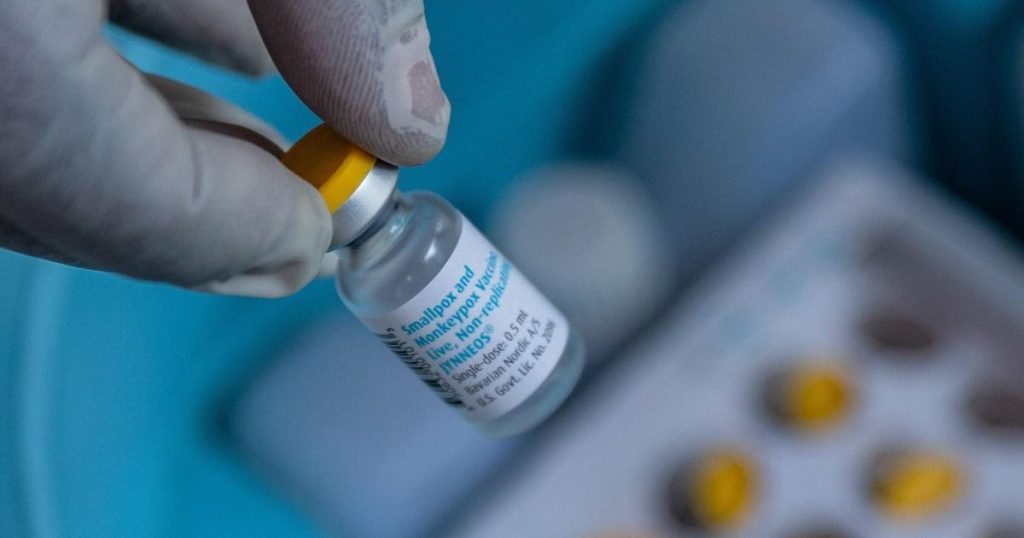Mpox Vaccination Expands Across England Amidst New Clade Concerns
The National Health Service (NHS) in England has significantly broadened its mpox vaccination program, adding twelve new sites to the existing nineteen. This expansion aims to ensure equitable access to the vaccine for individuals at higher risk of contracting the virus, regardless of their location. The mpox vaccine is primarily offered to men who have sex with men and have multiple partners, a group identified as being at elevated risk. This proactive approach follows the detection of a new mpox clade, clade 1b, in England, distinct from the strain that has been circulating at low levels since 2022. The government’s proactive measure of securing additional vaccine doses underscores the commitment to bolstering the nation’s preparedness against the virus. This expansion of vaccination access serves as a crucial element in the multifaceted strategy to mitigate the potential impact of the new clade and maintain control over mpox transmission.
The newly established vaccination sites are strategically distributed across the country, covering regions such as the West Midlands (Birmingham), East Midlands (Nottingham), South Yorkshire (Sheffield), Tyne and Wear (Sunderland), East Yorkshire (Hull), West Yorkshire (Leeds), Merseyside (Liverpool), Lancashire (Blackpool), Hampshire (Southampton), Bristol, Devon (Exeter), and Hertfordshire (Hatfield). This comprehensive geographical coverage aims to ensure that eligible individuals in all regions have convenient access to vaccination services. The NHS encourages eligible individuals to utilize the NHS website to locate their nearest vaccination site, emphasizing the ease and accessibility of the process. This proactive approach to vaccination is a cornerstone of the public health response, aiming to protect vulnerable populations and limit the spread of the virus.
Mpox, previously known as monkeypox, presents with a range of symptoms, including fever, headaches, muscle aches, backache, and characteristic skin rashes. These rashes, which can manifest anywhere on the body, typically appear one to five days after the initial onset of fever, headache, and other symptoms. They evolve into spots, blisters, or ulcers, serving as a key clinical indicator of the infection. Transmission occurs primarily through direct contact with these skin lesions, scabs, or bodily fluids from an infected person. This can happen during sexual contact, kissing, cuddling, or any other form of skin-to-skin contact. Additionally, contact with contaminated materials, such as bedding, towels, or clothing, can also transmit the virus. Close and prolonged face-to-face contact, involving activities like talking, breathing, coughing, or sneezing, can also pose a transmission risk, albeit a lower one compared to direct contact with lesions or fluids.
The expansion of vaccination centers follows the identification of the first case of clade 1b mpox in England in October. This new clade represents a different strain from the one previously circulating at relatively low levels in the UK since 2022. The emergence of a new clade underscores the dynamic nature of the virus and the need for ongoing vigilance. The government’s prompt action in securing additional vaccine doses and expanding access to vaccination points demonstrates a proactive approach to managing the potential threat posed by this new variant. The proactive vaccination strategy aims to protect vulnerable populations and mitigate the potential impact of clade 1b on public health.
Health officials emphasize the importance of vaccination for eligible individuals, particularly men who have sex with men and have multiple partners. While the overall risk to the public remains low, vaccination provides a crucial layer of protection against mpox. The expanded availability of vaccination sites makes it easier for eligible individuals to access this preventive measure. Health authorities urge individuals experiencing symptoms or noticing unusual skin changes, such as new lesions or rashes with blisters, to seek medical advice promptly. This includes staying home and avoiding close contact with others until receiving medical guidance. This proactive approach to seeking medical care is crucial for early diagnosis, treatment, and preventing further transmission.
The emergence of clade 1b mpox in England adds another layer of complexity to the public health landscape. While clade 2 cases remain low, they persist, highlighting the ongoing need for vigilance and preventive measures. Vaccination remains a cornerstone of the national mpox strategy, offering a significant level of protection against the virus. The UK Health Security Agency (UKHSA) emphasizes the importance of vaccination for eligible individuals, underlining its critical role in bolstering the nation’s defenses against mpox. The expanded access to vaccination sites and the continuous monitoring of the situation underscore the commitment to containing the spread of mpox and safeguarding public health.











